How to Conduct Effective Employment Reference Checks
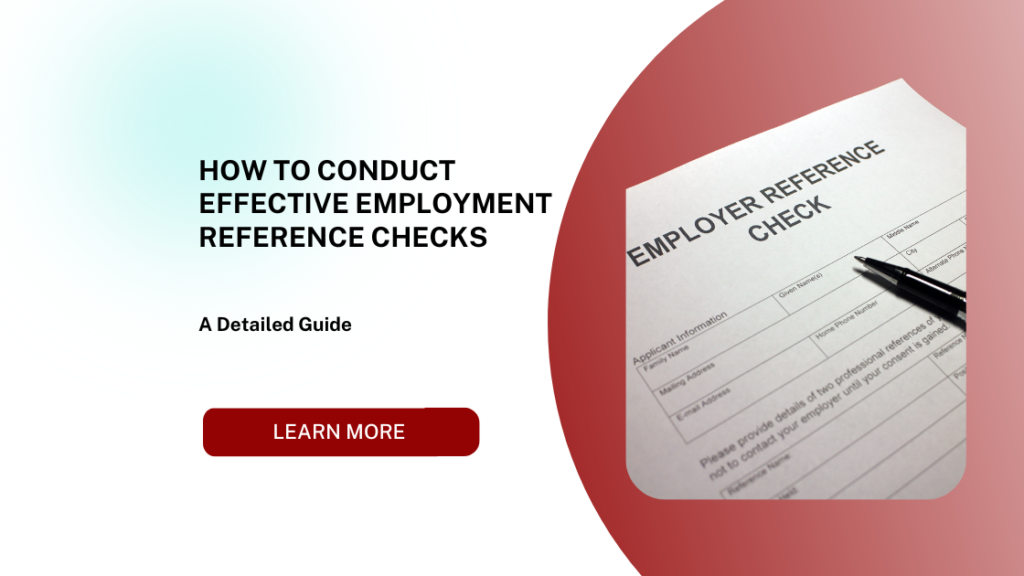
Understanding Employment Reference Checks
An employment reference check is a crucial part of the hiring process in which employers contact a job candidate’s previous employers, colleagues, or other professional references to verify the information provided in their application or resume. This process helps employers assess the candidate’s qualifications, work ethic, and overall fit for the role.
In essence, an employment reference check is a way to ensure that the candidate is who they claim to be and that they possess the skills and attributes necessary for the position. It is also an opportunity to confirm the candidate’s job performance, reliability, and behavior in a professional setting.
Why Are Employment Reference Checks Important?
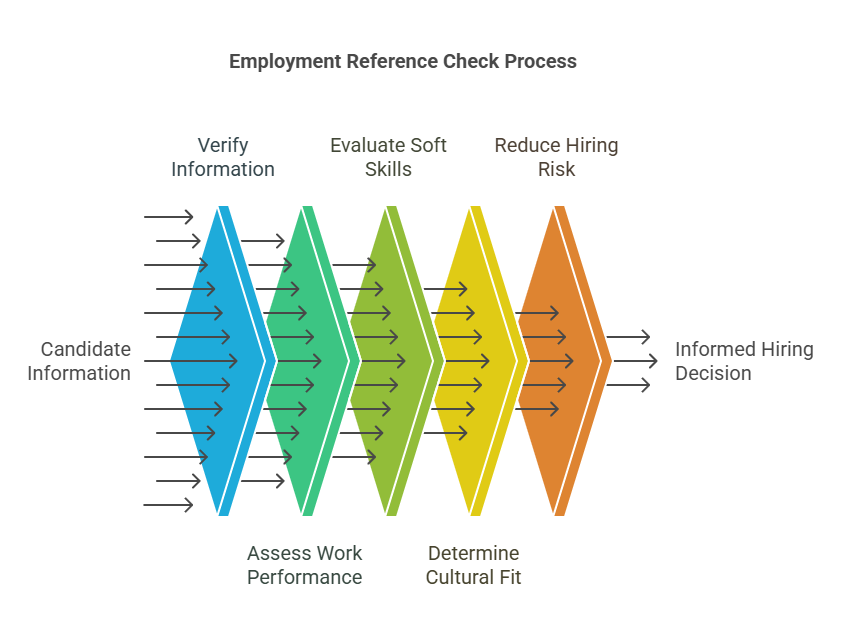
Employment reference checks are important for several reasons:
- Verification of Information: Reference checks allow employers to confirm that the details a candidate has provided about their employment history, job responsibilities, and achievements are accurate. This can help prevent fraudulent claims or misrepresentation.
- Insight into Work Performance: Reference checks offer insight into a candidate’s past work performance. Employers can learn about the candidate’s strengths, areas for improvement, and how they approached challenges in previous roles.
- Evaluation of Soft Skills: While resumes and interviews provide information about a candidate’s technical abilities, reference checks help uncover important soft skills such as communication, teamwork, and leadership. These traits are often just as important as technical skills, depending on the role.
- Cultural Fit: A reference check helps assess whether the candidate will fit into the company’s culture. A good fit can improve employee satisfaction and retention, while a poor fit can lead to dissatisfaction and turnover.
- Reducing Hiring Risk: By confirming the information provided by the candidate and gaining insights into their professional behavior, reference checks can reduce the risk of hiring the wrong candidate, which can be costly for a business.
Role of Employment Reference Checks in Verifying Background, Skills, and Work Ethic
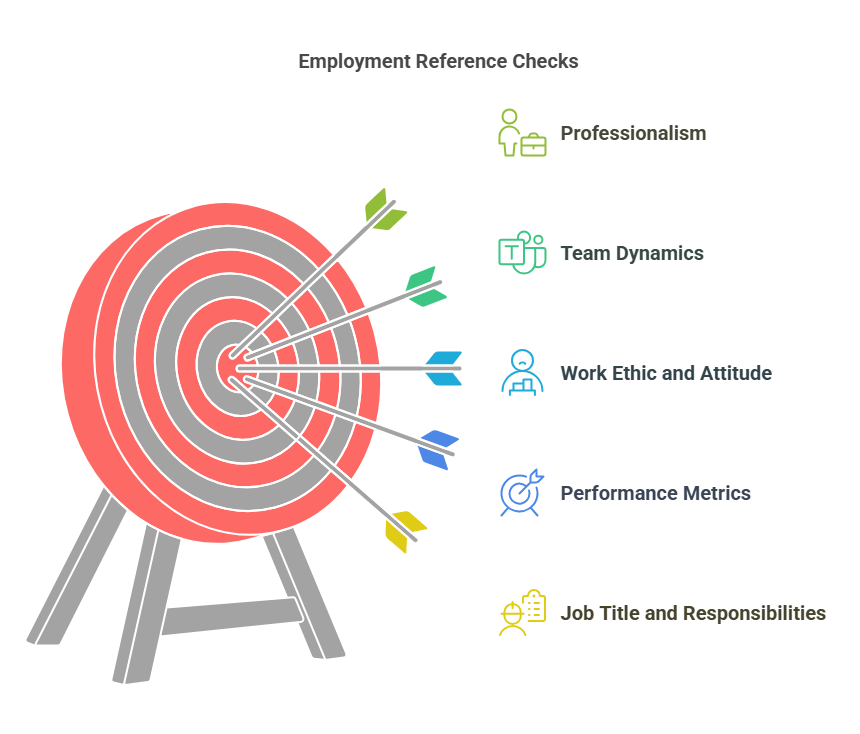
When employers conduct reference checks, they are verifying multiple aspects of a candidate’s qualifications, such as:
- Job Title and Responsibilities: Ensuring the candidate’s job title and the responsibilities they listed match the details provided by previous employers.
- Performance Metrics: Reference checks allow employers to learn about the candidate’s job performance, such as meeting deadlines, achieving sales targets, or contributing to team goals.
- Work Ethic and Attitude: References can provide insight into the candidate’s attitude toward their work, how they handled stressful situations, and whether they demonstrated initiative and dependability.
- Team Dynamics: Employers often inquire about how the candidate worked with others, including their relationship with colleagues, supervisors, and subordinates.
- Professionalism: Reference checks help assess the candidate’s professionalism, including punctuality, reliability, and how they handled workplace challenges.
Benefits of Conducting Employment Reference Checks
Conducting employment reference checks provides benefits to both the employer and the candidate:
For Employers:
- Informed Decision-Making: Employers can make more confident hiring decisions by confirming that a candidate has the necessary qualifications and work habits.
- Reducing Turnover: By verifying cultural and skill fit through reference checks, employers can lower the chances of hiring a candidate who is not suited for the role, reducing the risk of turnover.
- Compliance and Risk Management: Reference checks help ensure compliance with company policies and regulations, while also minimizing the risk of hiring individuals who might cause workplace disruptions or legal issues.
For Candidates:
- Opportunity for Positive Endorsement: A strong reference can enhance a candidate’s chances of securing a job by showcasing their achievements and qualifications from a credible source.
- Clarifying Career Gaps: Candidates who may have gaps in their employment history or who are changing industries can use references to explain their past experiences and how they are relevant to the new role.
Common Types of References Employers May Contact
Employers typically reach out to different types of references to gain a comprehensive view of the candidate. These include:
| Type of Reference | Description |
|---|---|
| Previous Supervisors | Direct managers who can speak about the candidate’s job performance, strengths, and areas for improvement. |
| Colleagues or Co-workers | Peers who worked alongside the candidate and can provide insights into their teamwork, communication, and collaboration skills. |
| Direct Reports | Subordinates who can speak about the candidate’s leadership style, communication, and decision-making. |
| Human Resources (HR) Department | HR personnel can confirm employment details such as job titles, dates of employment, and reasons for leaving. |
| Mentors or Clients | People who guided or worked closely with the candidate in a non-supervisory capacity, offering insights into their professional development or client interaction skills. |
| Professors or Educational Advisors | For recent graduates, academic references can provide insights into work ethic, achievements, and potential for growth. |
In some cases, employers may also choose to contact third-party reference checking services to streamline the process and ensure consistency across different reference checks.
Top Employment Reference Check Questions
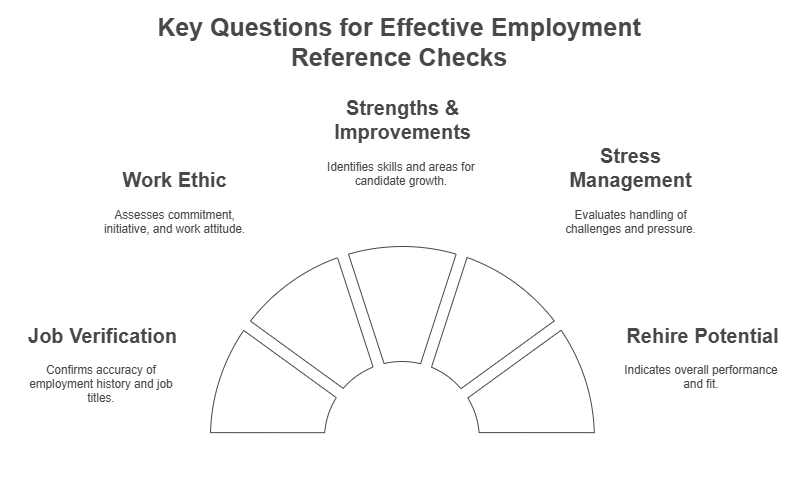
When conducting an employment reference check, employers typically ask a variety of questions to assess the candidate’s qualifications, work ethic, and overall fit for the position. These questions are designed to verify the information provided by the candidate and gather further insights into their professional behavior and character. Below are some of the most common employment reference check questions:
1. Can you confirm the candidate’s job title and dates of employment?
This is a foundational question aimed at verifying the accuracy of the candidate’s employment history. Employers want to confirm that the candidate’s stated job title and the duration of their employment with the previous company are correct. This is also useful in clarifying any potential gaps or discrepancies in the candidate’s work history.
2. How would you describe the candidate’s work ethic and attitude?
This question helps employers understand the candidate’s approach to their work. Employers typically seek information about the candidate’s level of commitment, initiative, and whether they are a self-starter. They may also want to know if the candidate takes ownership of their work and how they handle challenges or setbacks.
3. What are the candidate’s strengths and areas for improvement?
By asking about strengths and areas for improvement, employers get a well-rounded view of the candidate’s capabilities. References often provide insight into specific skills the candidate excels in, such as leadership, problem-solving, or teamwork. They also offer suggestions for areas where the candidate could improve, which is helpful in determining whether the candidate is suitable for the role in question.
4. How did the candidate handle challenges or stressful situations?
Understanding how a candidate manages stress is critical, especially for positions that involve tight deadlines, high-pressure environments, or complex problem-solving. Employers often seek specific examples of how the candidate navigated difficult situations, whether they worked independently or sought help, and how they maintained composure under pressure.
5. Would you rehire the candidate if given the opportunity?
This is one of the most important questions an employer can ask. A reference’s willingness to rehire a candidate speaks volumes about the individual’s overall performance, reliability, and fit within the organization. A positive response to this question indicates that the candidate left a lasting impression, while a negative or neutral answer may prompt further questions about the candidate’s suitability.
Best Practices for Employers Conducting Reference Checks
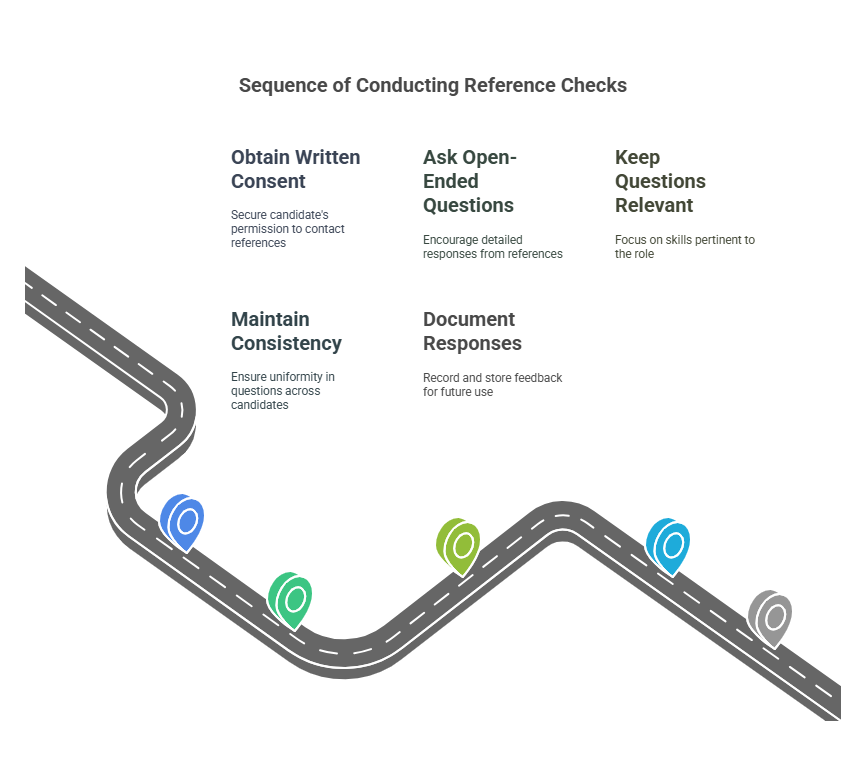
Conducting a reference check is a delicate process, and employers should approach it professionally. Here are some best practices to keep in mind:
1. Obtain Written Consent from the Candidate
Before reaching out to references, employers must obtain the candidate’s written consent to contact their references. This is not only a professional courtesy, but it is also required by law in many cases. The candidate should be aware of which references the employer will contact and the type of information that will be requested.
2. Ask Open-Ended Questions
Open-ended questions encourage more detailed and thoughtful responses. Instead of asking yes/no questions, try to phrase questions in a way that invites the reference to provide examples and elaborate on their answers. For example, instead of asking “Did the candidate meet deadlines?” ask, “Can you describe how the candidate managed deadlines during their time with your company?”
3. Keep Questions Relevant to the Role
The reference check should focus on the skills and experiences that are most relevant to the role the candidate is being considered for. Tailor your questions based on the candidate’s responsibilities in the previous position, the company culture, and the specific job requirements.
4. Maintain Consistency
For each candidate, try to ask the same core questions during the reference check. This ensures consistency and fairness in evaluating each candidate’s background. It also helps employers identify patterns or discrepancies in the feedback received from various references.
5. Document Responses
Keep thorough records of the reference check responses. This documentation may be valuable if the hiring process is challenged or if there is a need to verify the candidate’s background at a later date.
Best Practices for Candidates Preparing for Reference Checks
While the employer conducts the reference check, candidates should also prepare to ensure the process goes smoothly. Here are some tips for candidates:
1. Choose References Wisely
Candidates should select references who are familiar with their work and can provide specific, positive insights. Ideally, these should be previous supervisors, managers, or colleagues who can speak to the candidate’s performance and contributions. Candidates should also ensure that their references are willing and available to speak on their behalf.
2. Communicate with References Ahead of Time
It’s important for candidates to notify their references in advance that they may be contacted. This gives the reference time to prepare and ensures they know what to expect. Candidates should also brief their references about the job they are applying for so they can tailor their responses accordingly.
3. Be Transparent About the Process
Candidates should be upfront with potential employers about any challenging situations they faced in previous jobs, such as performance issues or conflicts with colleagues. Being honest about past experiences will help set expectations for references and allow them to provide more accurate feedback.
4. Follow Up
After the reference check is complete, candidates can follow up with their references to express gratitude. This also shows professionalism and appreciation for the time and effort the reference took to support the candidate.
How ExactBackgroundChecks.com Can Help with Reference Checks
ExactBackgroundChecks.com offers services that help businesses streamline the employment reference check process. Our platform allows employers to quickly gather reference information from multiple sources, ensuring accurate and comprehensive evaluations. Additionally, our service provides tools that help employers stay compliant with legal regulations while conducting thorough background checks.
Legal Aspects of Employment Reference Checks
When conducting employment reference checks, both employers and candidates must navigate a complex set of legal requirements to ensure the process is fair and compliant with privacy laws. Below, we explore key legal considerations involved in employment reference checks.
1. Obtaining Consent
One of the most critical legal aspects of employment reference checks is obtaining the candidate’s consent before contacting their references. Under the Fair Credit Reporting Act (FCRA) and other privacy laws, employers are required to get written permission from the candidate to contact their references. This consent should clearly explain which individuals will be contacted and the type of information that will be gathered.
Employers should ensure that the candidate understands that the reference check is a part of the hiring process and that they agree to have their former employers or colleagues contacted for information regarding their performance.
2. Privacy Concerns
Employers must be cautious when asking questions during reference checks to avoid violating privacy laws. For instance, asking about a candidate’s medical history, disability status, sexual orientation, or religious beliefs is illegal in most circumstances. Reference checks should focus solely on the candidate’s work-related skills, qualifications, and performance.
Employers should also avoid disclosing personal information about the candidate to others. Maintaining confidentiality ensures the candidate’s privacy rights are upheld.
3. What Can Be Asked
While employers can ask for information about a candidate’s work performance, general behavior, and suitability for the job, there are restrictions on certain types of inquiries. For example, references should not be asked about:
- The candidate’s personal life or family background.
- The candidate’s age, race, gender, or marital status.
- Details about the candidate’s criminal history (unless it directly relates to the job position).
Employers must also be aware of state-specific laws that may impose additional restrictions on what can be discussed during reference checks.
4. Discriminatory Practices
It is essential for employers to conduct reference checks without engaging in discriminatory practices. For example, if an employer requests a reference check but excludes certain candidates based on their race, religion, or other protected characteristics, it can be considered discriminatory. Employers should ensure that reference checks are consistent for all candidates to avoid any claims of unfair treatment or bias.
Frequently Asked Questions (FAQs) about Employment Reference Checks
Below are answers to some of the most commonly asked questions regarding employment reference check questions.
What is an employment reference check?
An employment reference check is when employers contact a job candidate’s previous employers, colleagues, or other professional references to verify their qualifications and work history.
Why are employment reference checks important?
They verify information, provide insights into work performance and soft skills, assess cultural fit, and reduce the risk of hiring the wrong candidate.
What types of references do employers typically contact?
Employers contact previous supervisors, colleagues, direct reports, HR departments, mentors, clients, and professors or educational advisors.
What are some common questions asked during an employment reference check?
Common questions include verifying job title and dates of employment, describing work ethic and attitude, identifying strengths and areas for improvement, assessing how the candidate handles challenges, and asking if the reference would rehire the candidate.
What legal aspects should employers consider when conducting reference checks?
Employers must obtain written consent from the candidate, respect privacy concerns by avoiding illegal questions, be aware of state-specific laws, and avoid discriminatory practices.
What is an employment reference check?
An employment reference check is when employers contact a job candidate’s previous employers, colleagues, or other professional references to verify their qualifications and work history.
Why are employment reference checks important?
They verify information, provide insights into work performance and soft skills, assess cultural fit, and reduce the risk of hiring the wrong candidate.
What types of references do employers typically contact?
Employers contact previous supervisors, colleagues, direct reports, HR departments, mentors, clients, and professors or educational advisors.
What are some common questions asked during an employment reference check?
Common questions include verifying job title and dates of employment, describing work ethic and attitude, identifying strengths and areas for improvement, assessing how the candidate handles challenges, and asking if the reference would rehire the candidate.
What legal aspects should employers consider when conducting reference checks?
Employers must obtain written consent from the candidate, respect privacy concerns by avoiding illegal questions, be aware of state-specific laws, and avoid discriminatory practices.
Conclusion
Employment reference checks are an essential part of the hiring process, providing valuable insights into a candidate’s professional background, work ethic, and behavior. By asking the right employment reference check questions and adhering to legal guidelines, employers can ensure that they are making informed and compliant hiring decisions.
Candidates, on the other hand, should prepare for the reference check process by selecting the right references and being transparent about their work history and qualifications. Following these best practices ensures a smoother process for both employers and candidates.
For employers looking to streamline the reference check process, ExactBackgroundChecks offers efficient solutions that help you verify a candidate’s qualifications quickly, accurately, and legally. By utilizing expert services like ours, you can enhance your hiring process and ensure a seamless experience from start to finish.



